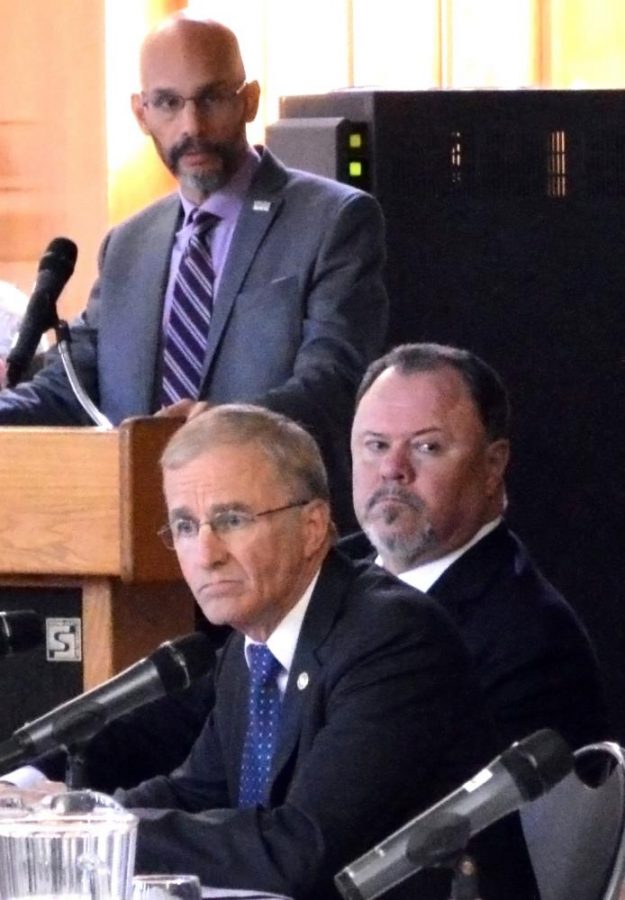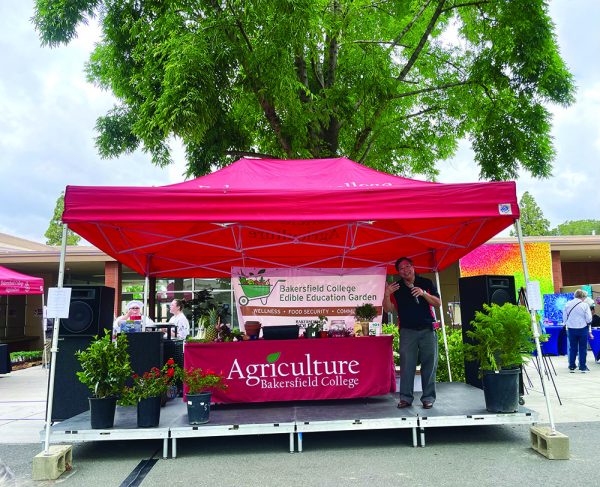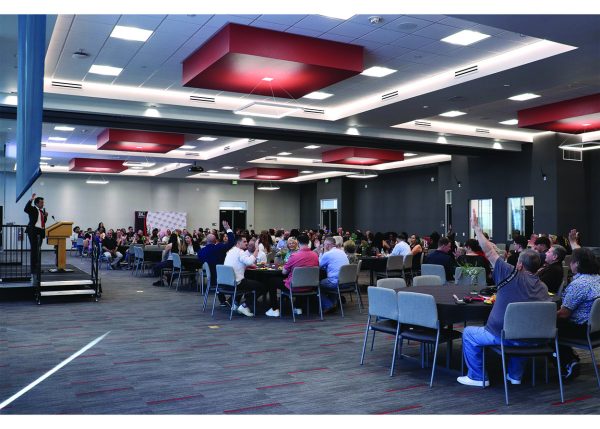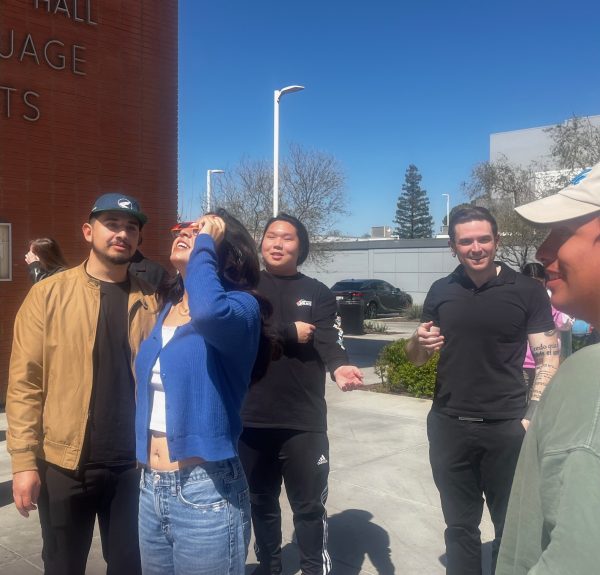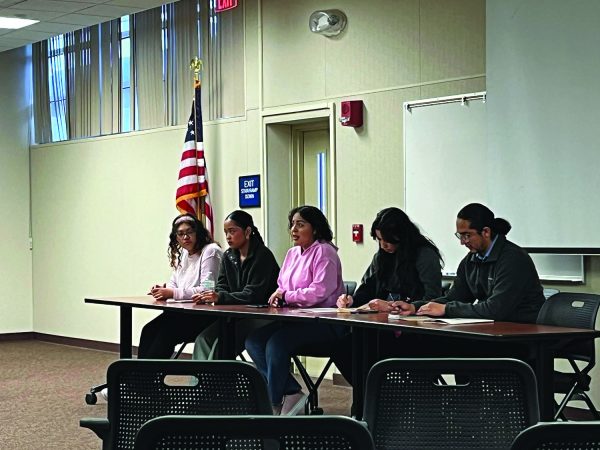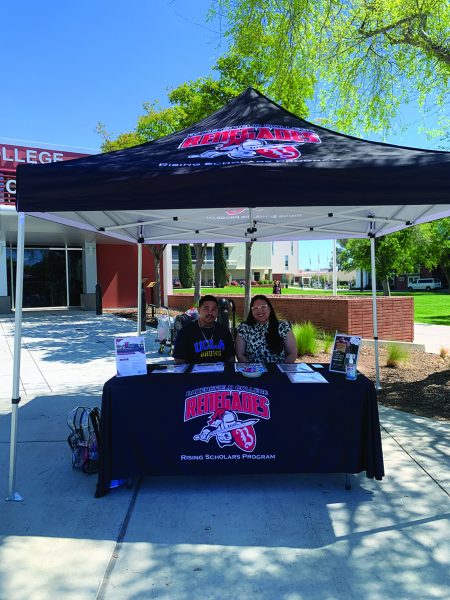DACA panel held in Fireside Room overrun with students
Win Eaton and H.A. Salas listen to BC students’ concerns.
October 4, 2017
On Sept. 21 a group of six local lawyers held a panel discussion in the Fireside Room at Bakersfield College, in order to address frequently asked questions and concerns regarding the rescinding of the Deferred Action for Childhood Arrivals, or DACA, program.
The Fireside Room, which holds up to 125 audience members, was filled to capacity; requiring that a conference room in the campus center be opened up to handle the overflow. The discussion was live-streamed, allowing those in the overflow venue to view the forum in real-time.
Attorneys Win Eaton, H.A Sala, Sarah Rich, Vanessa Sanchez, Edyta-Christina Grzybowska-Grant, and Andrew Fishkin held an open forum which concluded with students having the opportunity to consult the lawyers about general questions regarding immigration and deportation.
The panel discussion lasted over an hour and covered topics ranging from what the announcement by the Trump administration on Sept. 5 means for current DACA recipients, to ways in which those who are currently undocumented can avoid the threat of deportation.
There are approximately 27,600 students at BC. Approximately 800 of those students currently receive assistance and protections under DACA.
The forum began with a breaking down of what DACA was and ways in which it could potentially be replaced. Eaton pointed out that DACA was not a piece of legislation, but rather, an executive order made by former president Obama, and that the rescinding of that order could potentially lead to a more permanent solution for those with undocumented status.
“All of the pressure, all of the focus is where it needs to be- squarely in the laps of congress,” Eaton said, “The president doesn’t make law. The president doesn’t change law. The president is now enforcing the law, unfortunately the way the law was drafted and signed on Sept 30, 1996. For 21 years, no president has dared to enforce the law the way it was written, so congress has to act.”
Currently, what actions congress might take have left a lot of undocumented people feeling uncertain and insecure about what their futures might hold.
“I hope congress does something better for us. I hope legalization comes for us because that would be really amazing, especially for my family,” said Judith Diaz, a BC student and self-identified Dreamer, who attended the forum.
Diaz shared how her father had just become a permanent resident, and how she hoped his status would help her to gain legal residency, but Eaton says that a path to legal residency and citizenship isn’t always so simple, particularly for those who were brought here illegally as children.
Eaton said, “The law is complex. Here’s the bottom line- there is no mechanism in law or policy in the United States today … for young people who are brought here to fix their status.”
This means that a number of undocumented immigrants are not eligible to become citizens, simply because of their undocumented status.
According to the U.S. Citizenship and Immigration Services, or U.S.C.I.S, in order for one to begin the naturalization process, one must be at least 18 years old, be a lawful permanent resident or green card holder, and have maintained their permanent resident status or green card for at least five years. They also must have been physically present in the U.S. for a minimum of 30 months, be of good moral character, be able to speak, read, and write English, have knowledge of U.S. government and history, and be willing to take the “Oath of Allegiance.”
In order to obtain a green card, one usually has to be sponsored by a family member who already has legal residency or citizenship status, or be sponsored by an employer. Those who emigrate to the U.S. seeking asylum are also more likely to receive a green card, but the requirements for asylum seekers are strict; often requiring that the country of origin be engaged in civil war.
For those who do not qualify to become naturalized citizens under the U.S.C.I.S process, the only options are to return to their country of origin, to continue living in the U.S. illegally or until congress changes immigration law.
“There is some good news … You have a lot of rights, and ICE frequently tries to ignore those rights, but they’re very powerful and you will win if you exercise your rights,” said Fishkin.
All six attorneys contributed to a list of rights and suggestions to assist those who have not yet obtained permanent resident or citizenship status.
Including:
– Immigration officers do not have jurisdiction over U.S. citizens, and all who are on US soil, within 100 miles of a U.S. border, are presumed to be U.S. citizens until proven otherwise.
– Never volunteer information regarding immigration status.
– Everyone who is present in the U.S. is protected under the 4th Amendment, which guarantees that one cannot be subject to illegal searches and seizures. This means, unless authorities have a warrant signed by a judge, there is no requirement to offer information to law enforcement or ICE, or to open one’s door if authorities arrive at one’s home. Authorities cannot legally forcibly enter without a warrant signed by a judge or probable cause.
– Do not break any federal law. For example, possession and use of marijuana is legal under California state law, but not under federal law. Breaking federal law, regardless of state law, can result in grounds for probable cause of search and seizure, or arrest.
– If an attempt is made by authorities or law enforcement to detain or make an arrest, cooperate. Do not run. Do not fight. Do not escalate the situation in any way. Comply with the officer’s orders, while keeping in mind that his or her questions do not have to be answered.
– If arrested or detained, do not sign a voluntary departure form.
– If identified as an undocumented immigrant while under arrest, ask to contact the consulate from one’s country of origin.
– If placed under arrest, immediately ask to contact a lawyer.
The next six months will show whether or not congress decides on new laws that offer amnesty or a path to citizenship for undocumented immigrants. Until then, Eaton suggests that those who want a viable path to citizenship need to take action by informing those around them.
“This is a political fight that is unavoidable. The human suffering and the tragic separations that are going to be caused by this heavy-handed enforcement, without any relief, is untenable. It’s un-American,” said Eaton, “I think everyone in this room needs to be aware of how urgent this need is and we need to dispel the myths that are misguiding and misdirecting our national leaders right now.”


